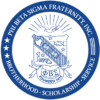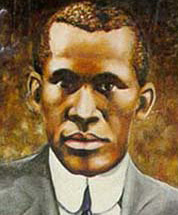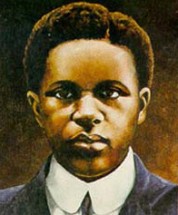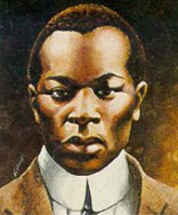|
A. Langston Taylor, the founder of Phi Beta
Sigma Fraternity, Inc., was born in Memphis, Tennessee. He graduated from the
Howe Institute in 1909 which is now Lemoyne-Owen College in Memphis. He
received his college and professional training at Howard and Frelinghuysen
University in Washington, D.C.
Founder Taylor chose business as his life’s calling. From
1917 to 1926 he owned a real estate and insurance business. He was
Secretary-Treasurer of the Potomac Investment Company, Director of the
Federal Life Insurance Company and President of the Taylor Tobacco Company.
Founder Taylor coined the Fraternity’s motto, “Culture for
Service, Service for Humanity”. He began serving humanity by founding Sigma,
to which he gave twelve consecutive years of service as a National Officer,
serving as National President, National Treasurer, National Secretary and
Field Secretary. He also served as President of the Distinguished Service
Chapter.
Founder Taylor was described as distinguished, poised and
truly a hard worker. The members of the Alpha Sigma chapter called Founder
Taylor “Prof”, short for professor, because he was always carrying a book, files
or reading. In addition to holding national offices in Phi Beta Sigma, he
served in various capacities in The Washington Art Society, The Derby Club,
The Banneker Research Society, The Mu-So-Lit Club and the Tennessee State
Club.
A tireless worker, Founder Taylor strove to ensure that Phi
Beta Sigma would make a significant impact in the world well beyond his years
of service. He served on the History Committee, providing numerous notations,
minutes and oral history to be passed on to future members. Founder Taylor
retired from federal service as an employee of the Smithsonian Institute.
Founder Taylor is buried at Lincoln Memorial Cemetery in
Suitland, Maryland (right outside of Washington, D.C.). His grave site sits
at the highest peek.
|
The Reverend Leonard F. Morse was the son of
a distinguished New England family, Mr. and Mrs. Frederick Morse of Boston,
Massachusetts. Trained in the elementary and secondary schools of New
Bedford, Massachusetts, he became the valedictorian of his integrated high
school and entered Howard University. In 1915, he graduated from Howard
University and was the first person to graduate in 3 years with two degrees,
an AB and a B.Ed. degree.
Founder Morse earned the Bachelor of Divinity degree from
the Payne School of Divinity at Wilberforce University, a Master’s degree
from Northwestern University (Evanston, Illinois), and the degrees of Doctor
of Metaphysics and the Doctor of Psychology from the College of Metaphysics
(Indianapolis, Indiana). He received the Doctor of Divinity (honorary) from
Allen University (Columbia, South Carolina) and the LLD at Edward Waters
College (Jacksonville, Florida).
An outstanding educator, minister and a prophetic voice of
his time, Founder Morse served at several academic and religious
institutions. He was Dean of Theology and President of Edward Waters College
and a Mason. Founder Morse founded and chartered numerous Sigma chapters,
especially in Florida.
Founder Morse was a student of the Greek language; he is
responsible for naming our Fraternity. In addition, he wrote Sigma’s first
constitution and was the first president of the Alpha Chapter. In the 1915
Howard University yearbook entitled “The Mirror”, Founder Morse had listed by
his name the following: Director of Social Service, YMCA, 1913-1914;
Organizer and President of Phi Beta Sigma, 1914-15; President, Young Men’s
Progressive Club, 1914-15; tutor of languages and history.
Founder Morse was married and had five children, two of
which are Brothers in this fraternity. In the 1915 Howard University
yearbook, Founder Morse left us with “Smooth runs the water where the brook
is deep.”
|
Founder Brown is believed to have been born
in Topeka, Kansas in 1890. Census records show that his father was the
Reverend John M. Brown and that his mother was Maggie M. Brown. However,
records at Howard University from 1910 have Founder Brown living at 1813
Titan Street in Philadelphia, Pennsylvania.
He was very cordial and very popular with the student body
and Howard University administration. Founder Brown is credited with choosing
the nine charter members of Phi Beta Sigma Fraternity. In addition, he
founded the Delta Chapter at Kansas State University in Manhattan, Kansas, on
April 9, 1917 and was a teacher at the Kansas Industrial School for Negroes
in Topeka, Kansas.
In the 1914 Howard University yearbook, under the Personals
and Applied Quotations section, Founder Brown left us with this, “No legacy
is so rich as honesty”. Founder Brown graduated from Howard University on
June 3, 1914. The last correspondence that the fraternity received from him
was a letter to Founder Taylor in 1924, in which Founder Brown indicated that
he was teaching in Kansas.
Census records and oral interviews show that Founder Brown
lived in the Topeka, Kansas area until 1931. Some believed that he was a
casualty of the First World War; others thought that he moved overseas. In
the spring of 1949, Founder Leonard F. Morse wrote “We live in daily hope
that we shall one day learn the fate of our beloved Brother and Founder”.
For more than 80 years, Sigma men pondered what may have
happened with Founder Brown. It was hoped that he went on to live a
productive and fruitful life – but the story of his disappearance, and
speculation about what may have happened became folklore within the
brotherhood. In 2015, a breakthrough occurred. A group of Sigma men who were
determined to find out what happened with Founder Brown, enlisted the help of
professional researchers and with the full support of the Fraternity, were
able to track Founder Brown to his final resting place. Indeed, he had kept
his commitment to the cause of Sigma, living and serving his last years in a
Catholic parish in Philadelphia, Pennsylvania. Founder Charles I. Brown
kept his promise to his brothers in Sigma!
|



